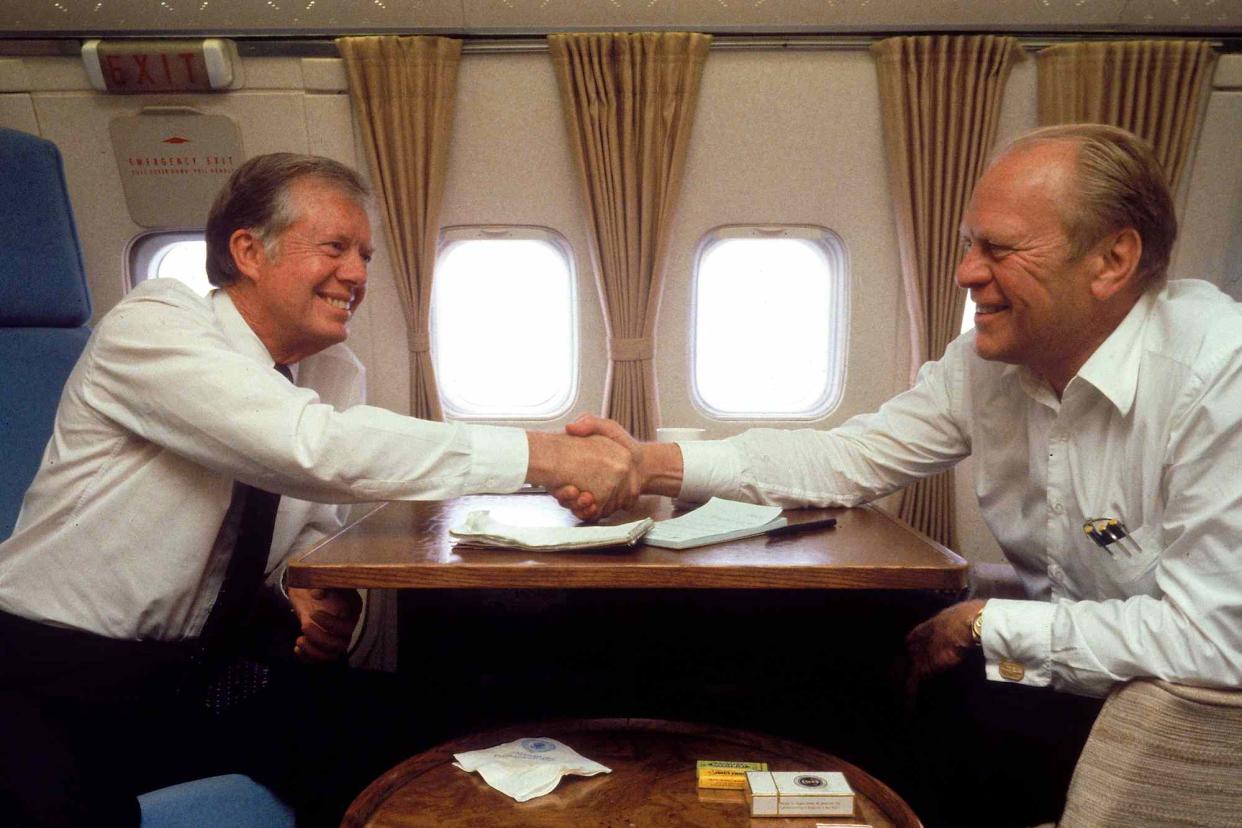
Dirck Halstead/Getty
Former Presidents Jimmy Carter and Gerald Ford reconnect on the way to Egyptian President Anwar El-Sadat’s 1981 funeral in Cairo
Though they were best remembered as political rivals, Presidents Jimmy Carter and Gerald Ford formed a tight bond behind the scenes — one that would span decades.
Ford, a Republican, took over as president of the United States upon Richard Nixon’s resignation in 1974 and, less than two years later, would be pitted against Carter, a Democrat, when both ran competing presidential campaigns.
Ultimately, Ford was defeated by Carter — but his friendship with the former governor of Georgia would persist despite any political differences.
According to Carter Center researcher Steve Hochman, who began working for President Carter in 1980, the 1976 campaign was “competitive,” but both men treated one another with respect.
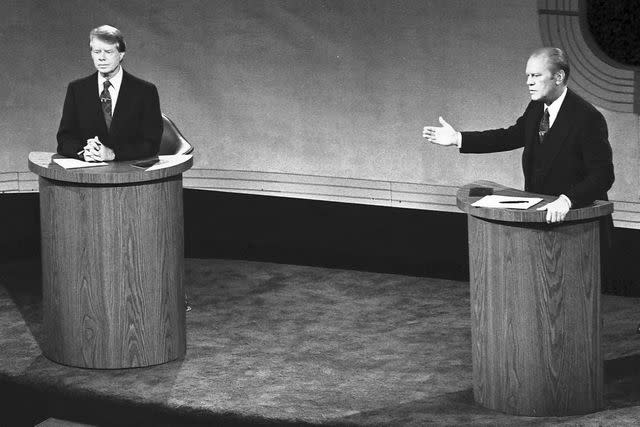

Universal History Archive/Getty
Jimmy Carter and Gerald Ford participate in a televised debate during the 1976 presidential election
At his Jan. 20, 1977, swearing-in, Carter made a point to reference Ford in his inaugural address, saying, “For myself and for our Nation, I want to thank my predecessor for all he has done to heal our land.”
And during his four years in office, President Carter often conferred with Ford, Hochman tells PEOPLE, by seeking his advice and support and keeping him informed of certain executive goings-on.
Their relationship would prove an integral part of some foreign policy decisions, including the Panama Canal treaties, the pursuit of arms control with the Soviet Union, and the U.S. relationship with China.
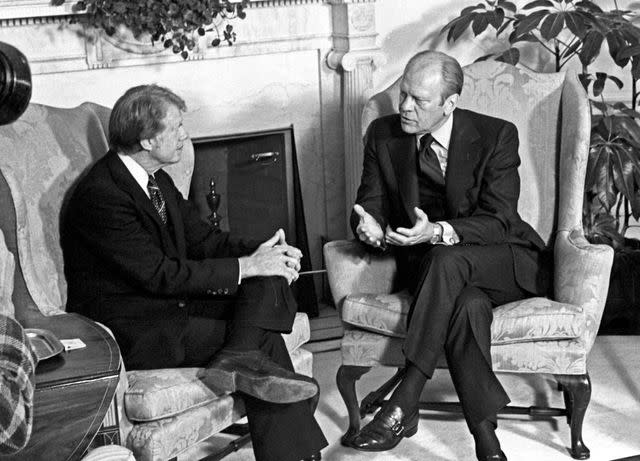

Consolidated News Pictures/Getty Images
Jimmy Carter and Gerald Ford chat in the Oval Office
During the 1980 campaign, the burgeoning partnership between the two hit a snag when Ford spoke out against Carter’s reelection — though, behind the scenes, he told Carter that the move wasn’t personal, chalking it up to “partisan rhetoric,” Hochman says.
The men would come together again in 1981 following the assassination of Egyptian President Anwar El-Sadat. The three former U.S. presidents at the time — Carter, Ford and Nixon — were all asked to represent the nation alongside sitting President Ronald Reagan in a reunion that Carter would later write made them feel “somewhat ill at ease” upon their first greeting at Andrews Air Force Base.
During the flights to Egypt and back, Carter and Ford renewed their once-cordial dynamic.
According to Hochman, “This would grow into a close friendship — ultimately the closest developed by any two modern former presidents.”
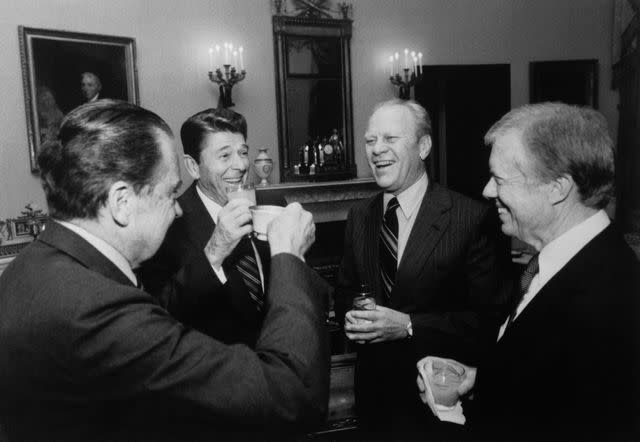

Getty President Ronald Reagan toasts with his three predecessors before they depart for Anwar El-Sadat’s funeral in Egypt
In 1983, the two met again, this time at the Ford Library in Ann Arbor, Mich., where they participated in a public policy conference. Hochman served as Carter’s aide on the trip, recounting how Ford gave them a personal tour of his presidential library, located on the campus of the University of Michigan.
The conference itself was a huge success, eliciting considerable national media attention and confirming for the two American leaders that, by working together, they could have a significant impact on issues most important to them.
Later that year, Carter invited Ford to join him as the co-chair of the first few major projects of The Carter Center, most of which revolved around public policy and attracted high-ranking leaders and scholars from across the world.
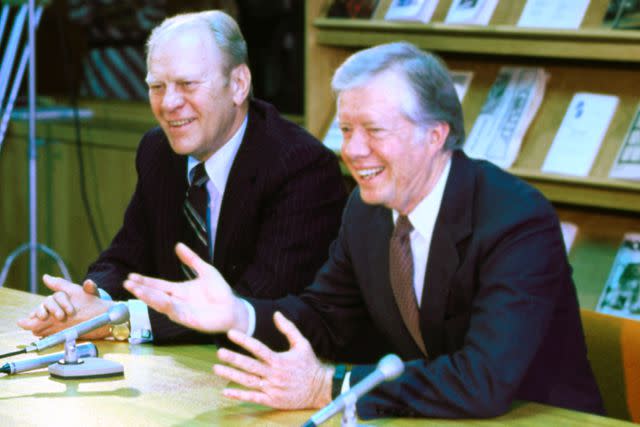

Bettmann Archive/Getty
Presidents Gerald Ford and Jimmy Carter at the Ford Presidential Library in Ann Arbor, Mich.
Ford connected with The Carter Center in other ways, too, and in June 1983, accepted an appointment as one of 12 members of the organization’s board of advisers.
All told, Carter’s staff estimates that he and Ford joined together on more than 25 projects, including one as recently as 2001: the National Commission on Federal Election Reform. Noting that Carter and Ford were both deemed honorary co-Chairs of the event, Hochman says in reality, “both were active leaders of the effort.”
“The recommended reforms influenced legislation and improved the election process. It wasn’t enough, but it made a difference,” he says.
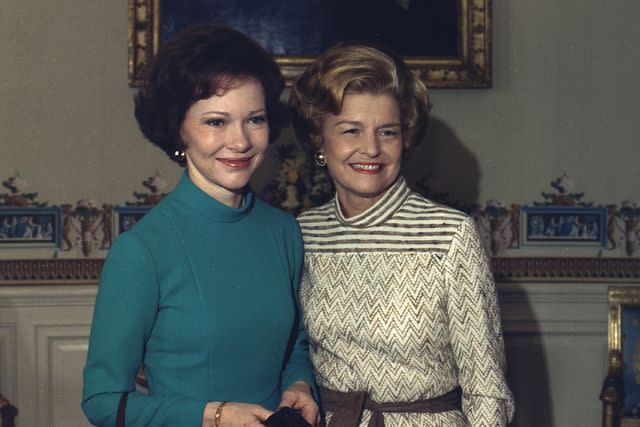

HUM Images/Universal Images Group via Getty Images
First ladies Rosalynn Carter and Betty Ford at President Jimmy Carter’s inauguration on Jan. 20, 1977
Of course, the friendship of the two men was enhanced by a similarly close friendship shared by their wives: Rosalynn Carter and Betty Ford. That close bond was forged in the mid-1970s when Carter, then the first lady of Georgia, hosted Ford, then the first lady of the country, at the governor’s mansion.
“She was the most distinguished guest we had ever had, but when she arrived, she was so warm and friendly that she immediately put me at ease, and we had a good time together,” Rosalynn later recalled of Betty.
Related: Rosalynn Carter and Betty Ford Shared an Unstoppable 40-Year Friendship: ‘A Formidable Duo’
They, too, had causes they shared, including advancing mental health initiatives and addressing and preventing substance abuse.
“Their personal respect and enjoyment of each other was significant,” Hochman says, adding that the two even asked one another to speak at their funerals (a request also shared by their husbands).
True to their promise, Rosalynn delivered a stirring eulogy for Betty at her 2011 funeral, saying, “Historians have said that our husbands, Jimmy and Jerry, developed a closer relationship than any other presidents after leaving the White House. I think Betty and I had a similar relationship.”
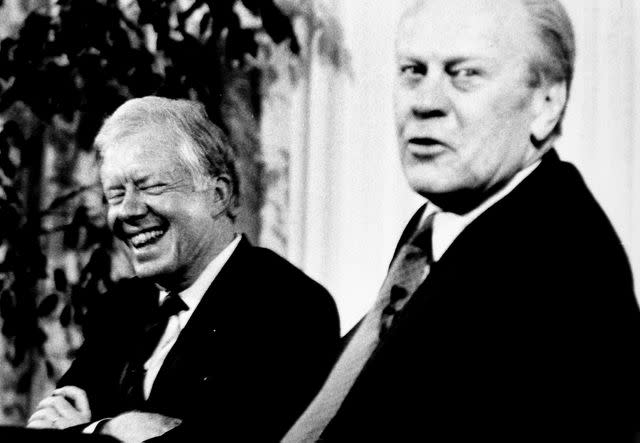

Monica Almeida/NY Daily News Archive via Getty
Presidents Jimmy Carter and Gerald Ford at Columbia University
Years earlier, in 2007, President Carter spoke at President Ford’s funeral.
“Jerry and I frequently agreed that one of the greatest blessings that we had, after we left the White House during the last quarter-century, was the intense personal friendship that bound us together,” Carter said in his eulogy.
Never miss a story — sign up for PEOPLE’s free daily newsletter to stay up-to-date on the best of what PEOPLE has to offer.
“The personal relationship developed between the Carters and Fords,” says Hochman, “is especially poignant all these years later, in light of the political division that’s unfolded since.”
“The example of their working together in a nonpartisan spirit of patriotism and service is what we can and should continue today and in the future.”
Read the original article on People
